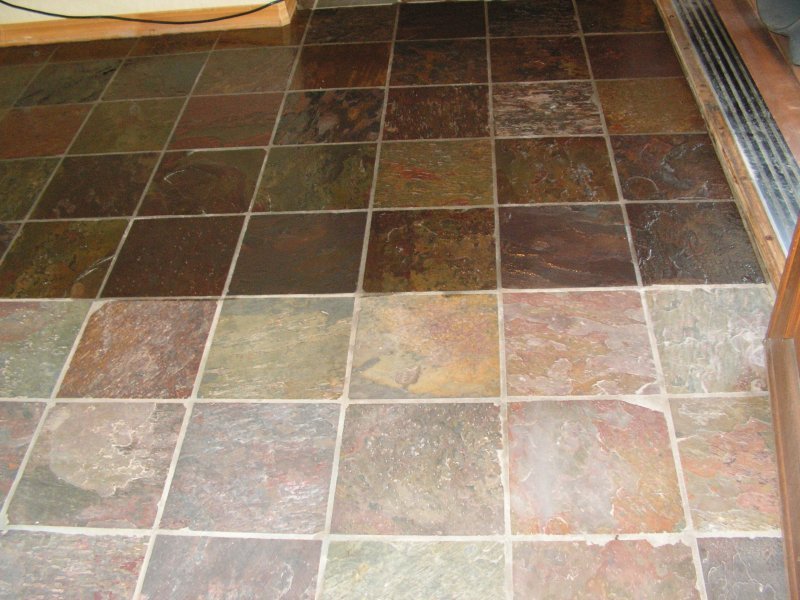Sealer vs. No Sealer
When it comes to the care and maintenance of natural stone, regardless of the type of stone, all stone needs to be cleaned and sealed periodically to ensure longevity of the material. In this article we will explain the qualities and uses of some of the most common types of sealers we use.
What happens when stone is not sealed?
All sealers protect against staining and etching to a certain extent on natural and manmade stone. Some sealers are moisture-wicking, and others can also alter the aesthetic of the stone by enhancing the color or adding a shiny, “wet look”.
When natural stone is not sealed, its pores are exposed to the elements. If it is a calcareous stone like marble, limestone or travertine, it will etch and absorb stains easily and thus require refinishing. If it is a porous stone like granite and not sealed, it can form pitted areas where water accumulates. If it is an unsealed flagstone or slate, it can absorb heavy mineral deposits, particularly if installed on the exterior near a water source.
Worst of all is when grout is not sealed. This is because grout is highly porous and absorbs and traps all kinds of dirt. Grout can even grow mold and mildew in its pores. Regularly cleaning and sealing grout, even where there are ceramic tiles, will ensure clean floors, showers, countertops, pool copings, etc.
Impregnating or Penetrating Sealer
Impregnating sealer, also known as penetrating sealer, is a water-based sealer and therefore can be applied when the stone is still wet. It is our most commonly used sealer and is used both indoors and outdoors where it can hold up to harsh environments.
Penetrating sealer is moisture-wicking, therefore it prevents stains, dirt, and debris from being absorbed into the pores of the stone or grout. It lasts about 2-5 years, depending on the location of the stone (floors vs countertops), its use (heavy traffic vs low traffic), and its exposure to the elements (sun, wind, rain).
Penetrating sealer provides moderate protection against oil, grease, and water stains. It does not alter the look or feel of the surface whatsoever.
Acrylic Sealer
Acrylic sealer is also a water-based sealer. It can be used indoors or outdoors, and holds up to harsh environments. Acrylic sealer provides strong protection against oil, grease, and water stains.
Acrylic sealer will minimally enhance the color of the surface making it slightly darker than its natural state. It will also give it a high shine.
The application of this sealer is usually a two (2) day service, but can be done in one (1) day depending on if the weather allows for the material to be dry prior to application.
Acrylic Sealer
Enhancer Sealer
Enhancer sealer can be used indoors or outdoors. It is usually used to darken or enhance the appearance of a surface. Often it is used on Negra Marquina stone to keep it looking dark. It also provides a “wet look" with low shine.
Over time like any other sealer, enhancer sealer can fade, leaving the stone noticeably lighter in those areas. When this happens, the surface just needs to be cleaned and the sealer re-applied.
Enhancer Sealer vs. No Sealer
Lacquer Sealer
Lacquer sealer is lacquer-based sealer that is very robust. It can be used indoors or outdoors, and holds up to harsh environments.
Lacquer sealer provides strong protection against oil, grease, and water stains. This sealer will strongly enhance the color of the surface and provide a “wet look" with high shine. The best way to predict how lacquer sealer will look on your surface is to get the surface very wet (with a garden hose for example).
The application of this sealer is usually a two (2) day service, but could be longer depending on the amount of surface that needs to be covered. The first day is for cleaning the surfaces. The surfaces must be allowed to dry completely before the lacquer sealer is applied so we prefer to wait a day or two before application.
Lacquer Sealer
Mineral Oil
Mineral oil is a special type of oil specifically used on soapstone surfaces which are very porous. It is not like other sealers. The soapstone absorbs the oil which enhances the color of the soapstone, making it dark and uniform. Without mineral oil, soapstone appears a light to medium grey color. With mineral oil, it appears to be more like a charcoal color.
Mineral oil does not add shine to the surface of soapstone. It does provide some protection, and will fade over time. Homeowners who like the look of the mineral oil will find that it needs to be reapplied every 1-3 years to keep the surface looking consistent.
DIY or Call a Professional?
The sealers we just discussed are available to the consumer to purchase at local hardware stores. However, the quality of the sealers sold there are not as high as what our experienced technicians at CATA Stone Care & Restoration use.
CATA uses the highest quality cleaners and sealers to get the job done. Our impregnating sealer is even specially formulated for us direct from the laboratory. We are able to control the amount of active ingredient in the product, making ours more potent than any other on the market.
While applying sealer may seem like a no-brainer, each sealer has special cleaning instructions beforehand, and a special application method that needs to be followed. For best results, we do not recommend that you do it yourself, but rather call CATA to take care of sealing your surfaces for you.




